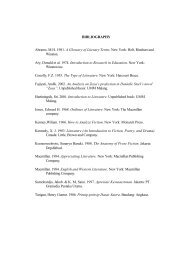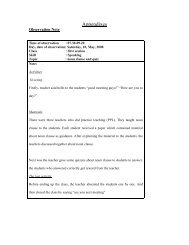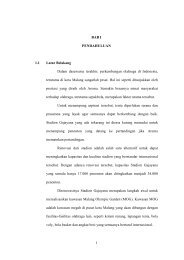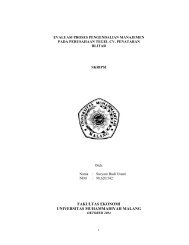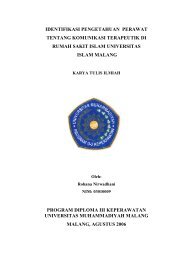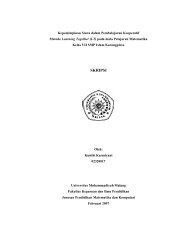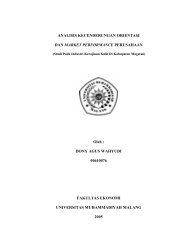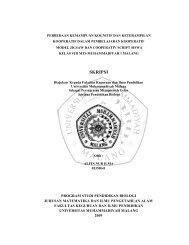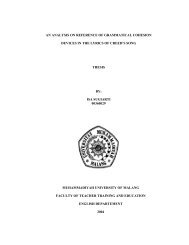File : THESIS.pdf - Universitas Muhammadiyah Malang
File : THESIS.pdf - Universitas Muhammadiyah Malang
File : THESIS.pdf - Universitas Muhammadiyah Malang
Create successful ePaper yourself
Turn your PDF publications into a flip-book with our unique Google optimized e-Paper software.
cycle;<br />
(d) outline the biological basis of the effect of oestrogen/progesterone<br />
contraceptive pills;<br />
(e) discuss and evaluate the biological, social and ethical implications of<br />
the use of contraception<br />
(f) outline the technique of in-vitro fertilisation (IVF) and discuss its ethical<br />
implications;<br />
(g) use the knowledge gained in this section in new situations or to<br />
solve related problems.<br />
PRACTICAL ASSESSMENT<br />
INTRODUCTION<br />
BIOLOGY 9700 A/AS LEVEL 2007<br />
Candidates should be given opportunities for the practice of experimental skills<br />
throughout the whole period of their course of study. As a guide, candidates<br />
should expect to spend at least 20% of their time doing practical work individually<br />
or in small groups. This 20% does not include the time spent observing teacher<br />
demonstrations of experiments and simulations. The practical work that<br />
candidates do during their course should aim to:<br />
• provide learning opportunities so that candidates develop the skills they<br />
need to carry out experimental and investigative work;<br />
• reinforce the learning of the theoretical subject content of the syllabus;<br />
• instil an understanding of the interplay of experiment and theory in scientific<br />
method;<br />
• prove enjoyable, contributing to the motivation of candidates.<br />
Candidates’ experimental skills will be assessed in papers 3 and 5. In both<br />
papers, the examiners may not be strictly bound by the subject content of the<br />
syllabus in finding contexts for the setting of questions. Within unfamiliar<br />
contexts, candidates will be told exactly what to do and how to do it. Within<br />
familiar contexts listed in the syllabus, the candidates will be expected to know<br />
how to use the techniques. Knowledge of theory and experimental skills will be<br />
drawn only from within the syllabus. Examples of unfamiliar contexts might<br />
include:<br />
• following instructions to set up and use unfamiliar equipment such as a simple<br />
respirometer;<br />
• making microscopic observations, drawing and magnification calculations<br />
from unfamiliar structures of specimens;<br />
• following instructions to use unfamiliar biochemical procedures.<br />
122



